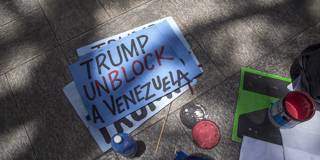During the current COVID-19 crisis, containment efforts must be global, and at-risk countries must be able to count on all necessary international assistance. Sanctions by the government of the world’s largest economy make this impossible.
NEW YORK – Over the past several years, US President Donald Trump’s administration has unilaterally imposed harsh economic sanctions on several countries whose governments it seeks to punish. These measures are inhumane, violate international law, and cause pain and suffering among the people that the United States claims it wants to help. With the whole world now facing the COVID-19 pandemic, US sanctions have also become a direct threat to the survival of people inside those countries – and everyone else. They should be immediately lifted.
It is no coincidence that Iran and Venezuela, two countries targeted by the US, are both being hit hard by the pandemic. Iran accounts for just 1.1% of the world’s population but an astounding 11.2% of COVID-19 deaths, while Venezuela appears to be on the verge of a massive outbreak, judging from the rapid spread of the disease since the first diagnosis in that country 12 days ago.
American sanctions have weakened both countries’ health infrastructure by curtailing access to foreign exchange and the capacity to import key medical inputs. In Venezuela, studies show that financial and oil-sector sanctions have cost the Venezuelan economy at least $17 billion a year since 2017, or more than four times the country’s level of non-oil imports. While sanctions are far from the only cause of the economy’s collapse, they were the driving factor behind the massive contraction in 2019, during which Venezuela lost one-third of its GDP. As UN Human Rights Chief Michelle Bachelet warned last August, the sanctions “are extremely broad and fail to contain sufficient measures to mitigate their impact on the most vulnerable sectors of the population,” with “far-reaching implications on the rights to health and to food in particular.”

NEW YORK – Over the past several years, US President Donald Trump’s administration has unilaterally imposed harsh economic sanctions on several countries whose governments it seeks to punish. These measures are inhumane, violate international law, and cause pain and suffering among the people that the United States claims it wants to help. With the whole world now facing the COVID-19 pandemic, US sanctions have also become a direct threat to the survival of people inside those countries – and everyone else. They should be immediately lifted.
It is no coincidence that Iran and Venezuela, two countries targeted by the US, are both being hit hard by the pandemic. Iran accounts for just 1.1% of the world’s population but an astounding 11.2% of COVID-19 deaths, while Venezuela appears to be on the verge of a massive outbreak, judging from the rapid spread of the disease since the first diagnosis in that country 12 days ago.
American sanctions have weakened both countries’ health infrastructure by curtailing access to foreign exchange and the capacity to import key medical inputs. In Venezuela, studies show that financial and oil-sector sanctions have cost the Venezuelan economy at least $17 billion a year since 2017, or more than four times the country’s level of non-oil imports. While sanctions are far from the only cause of the economy’s collapse, they were the driving factor behind the massive contraction in 2019, during which Venezuela lost one-third of its GDP. As UN Human Rights Chief Michelle Bachelet warned last August, the sanctions “are extremely broad and fail to contain sufficient measures to mitigate their impact on the most vulnerable sectors of the population,” with “far-reaching implications on the rights to health and to food in particular.”